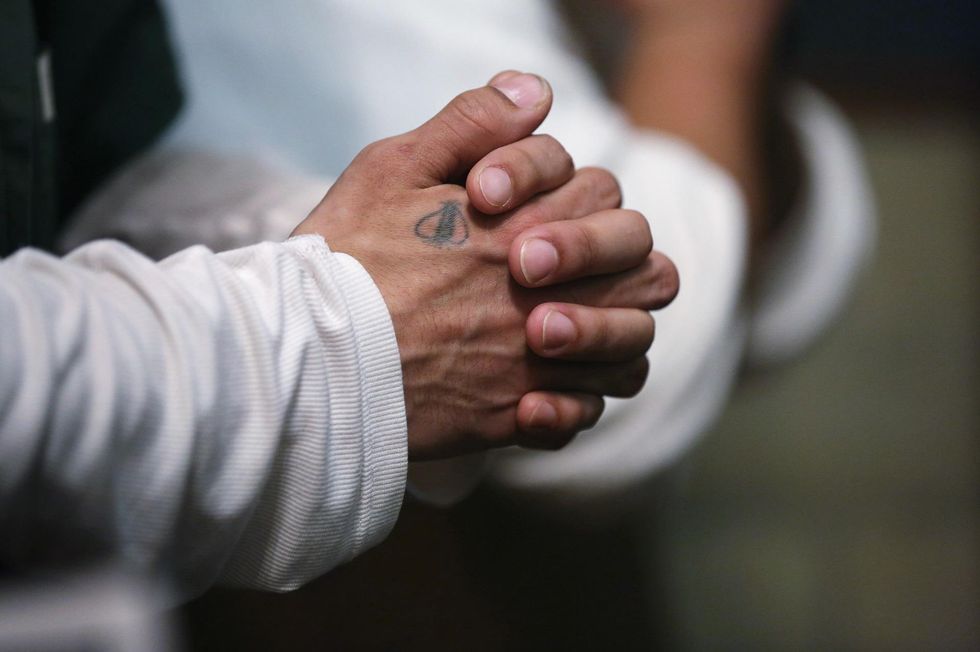
Prisoners pray as Archbishop of New York, Cardinal Timothy Dolan, celebrates Mass at the Wallkill Correctional Facility in Ulster County, New York. (John Moore/Getty Images)

Nothing gets my blood boiling more than when I hear of someone abusing a child, or committing an unwarranted act of violence. Folks who behave that way should not be in a position where they can cause further havoc or pain in society.
But this Thanksgiving, I'm grateful that our leaders are signaling greater attention to criminal justice reform, because it could truly change our society for the better. The United States incarcerates more people per capita than any other nation in the world. And you can't tell me that we're the most ill-behaved population on earth.
As a lifelong conservative, I've always believed in the heavy hand of the law: Punish those who have done wrong, which will serve them right, and they'll learn their lesson and America will be better for it.
Yet, inconsistent sentencing in our society has brought this issue to the forefront, for me; particularly in my reporting. This spring, I wrote about Kim Kardashian's trip to the White House, where she requested a pardon for a 62-year-old great-grandmother who served 21 years in prison for a first-time drug offense.
President Trump granted the pardon, after the inmate had been denied clemency three times by former President Barack Obama.
I'm no fan of Kim Kardashian. I'm sure she's a fine person. It doesn't matter — what matters is that it took someone of her celebrity status to make the plug for an inmate who represents too many of our fellow citizens who dip their toe into the illicit drug trade. Kardashian and Trump are both to be commended for their actions.
Incarceration kept the accused in that case from her children and grandchildren for more than 20 years.
It's easy for those of us who haven't served hard time (or any at all) to be dismissive of the sentencing handed down to folks who have been busted. But in a nation where most are living paycheck-to-paycheck, it's also easy for us to understand the damage done to citizens who are pulled out of the workforce when they mess up — and that damage transcends to their offspring.
Probably the most conservative conviction I have is for fiscal responsibility, which is partially why I have been driven to take a look at criminal justice reform — not only because of the human cost that has been paid for our inflated incarceration rates, but for the very real costs of keeping prisoners in a year-round concrete hotel.
Costs vary from state to state, but last year it was estimated that taxpayers dished out $75,000 a year for each inmate in California. That's roughly $15,000 higher than the median U.S. household earns on an annual basis. Surely, there's a better way.
Pew Research Center noted in May that while America's incarceration rate is at a two-decade low, we still have a larger share of our population in the clink than any other country in the world.
Some may say that means we're "tough on crime." Others might argue that we're not doing it right, considering the seemingly harmless acts citizens of other countries are put away for.
Recidivism is a huge problem. According to the National Institute of Justice, roughly two-thirds of released prisoners are rearrested within three years.
The reality is, what we're faced with currently is generations of folks who have come out of incarceration for nonviolent crimes, worse off than when they entered the system. Sure, I'm mostly talking about drug violations. And we all know the drug war has been an abysmal failure.
It's worthy to discuss whether or not drug dealers or users should be removed from society so as not to spread their influence and wares into society. But it's also worthy to discuss whether the costs of incarcerating such offenders is really worth the collateral damage.
Imagine if you were hauled to jail right now. Seriously. Given 10 years in the slammer for doing something illegal. Of course, we know you wouldn't do that, but if the easiest, quickest way to make a buck is from a thriving market of adults who are going to buy that product anyway ... one can see the allure.
Let's, for a moment, put ourselves in the place of those individuals. If you've never been in a financial situation where you were desperate — good on you. But human nature dictates that when times get tough, compromises are made.
Last week, President Trump revealed his support of a criminal justice reform bill aimed at giving judges more discretion, nullifying mandatory sentencing and allowing common-sense sentencing for nonviolent offenders.
The so-called "First Step Act" has already passed the House, and the president is urging the Senate to follow suit, saying, "I'll be waiting with a pen" to sign it into law.
Incarceration ruins lives: Often those of the imprisoned, and those of their families, irreparably. Being tough on crime doesn't mean society has to hold wrongdoers under water for eternity. This year, I'm grateful that we have leaders willing to step up and recognize it.